Picture this: you’re an ecommerce business owner racing to stay ahead in a rapidly evolving digital world. The competition is fierce, and you’re searching for inventive ways to draw in customers and boost your sales. That’s where artificial intelligence (AI) comes in!
This amazing technology is transforming how we interact with social media and, as a result, is revolutionizing the ecommerce realm.
Back in 2020, the global AI market was worth $62.35 billion, and it’s projected to skyrocket to a mind-blowing $733.67 billion by 2027, with a CAGR of 42.2% from 2021 to 2027 (according to Allied Market Research). With growth like that, it’s no surprise that AI has become a crucial component for ecommerce businesses around the globe.
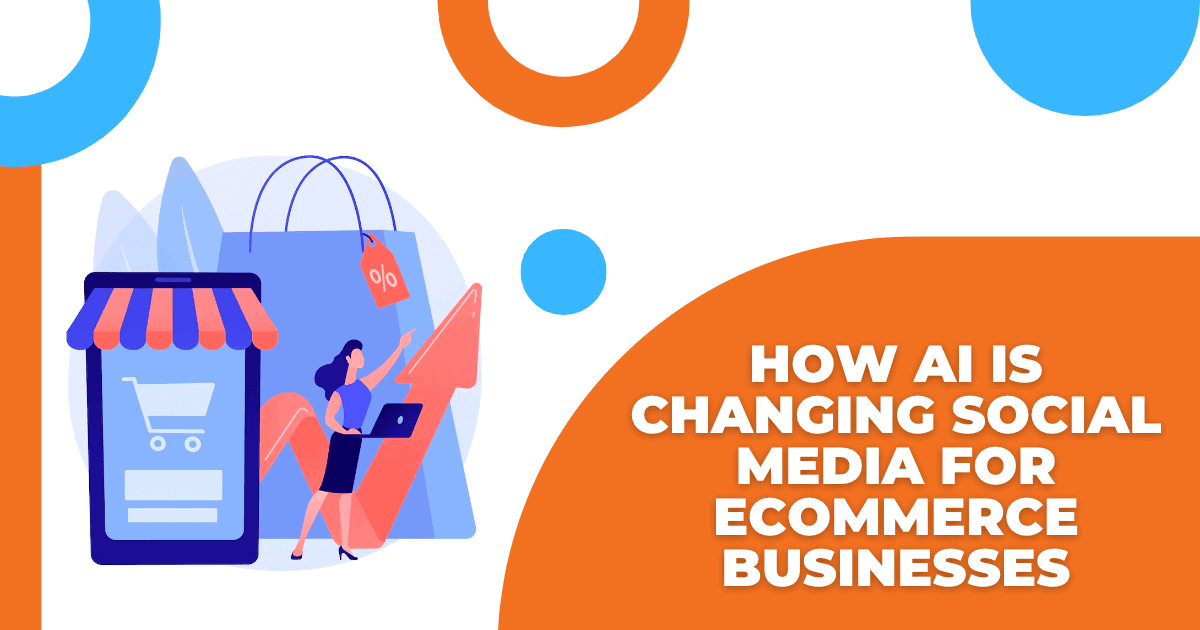
In this blog, we’ll delve into the captivating world of AI-powered social media and examine its potential to take your ecommerce business to the next level.
How Artificial Intelligence Is Transforming Ecommerce Businesses
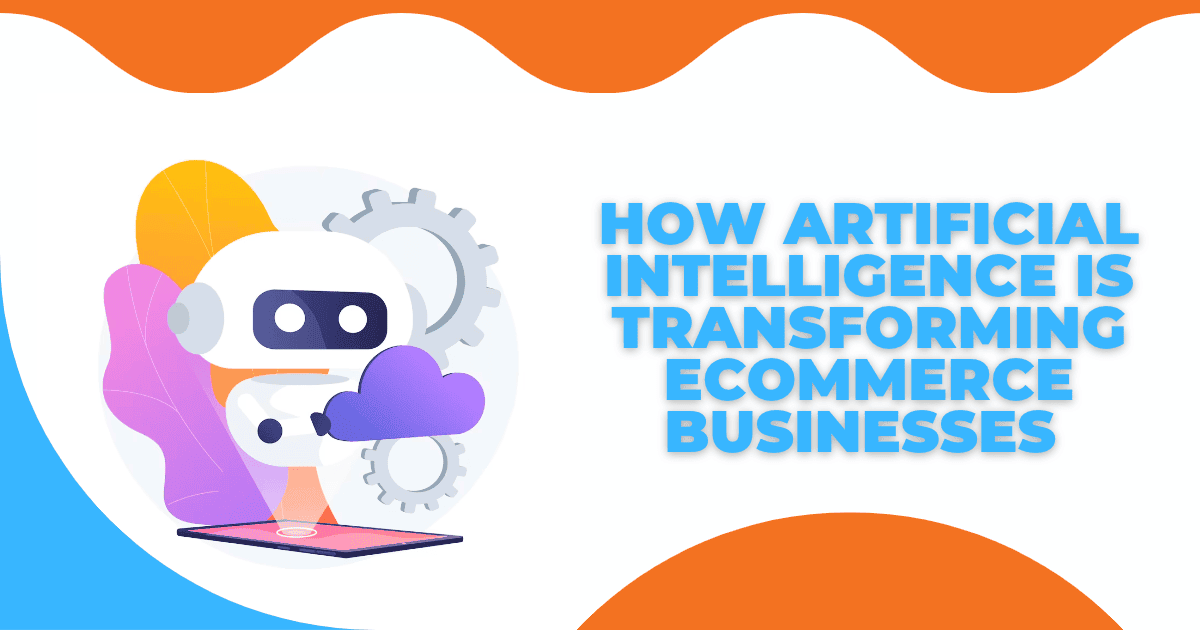
The ecommerce landscape is changing rapidly, and artificial intelligence (AI) plays a pivotal role in this transformation. Let’s explore the various ways AI positively impacts ecommerce businesses and how online retailers can take advantage of this cutting-edge technology.
Customized experiences
AI empowers ecommerce businesses to analyze customer data and behavior, allowing them to craft personalized shopping experiences. This level of personalization enhances customer satisfaction, leading to increased conversions and long-term customer loyalty.
Streamlined inventory management
By using AI algorithms to predict demand trends and optimize inventory levels, ecommerce businesses can avoid stock shortages and excess inventory. This results in cost savings and improved efficiency. Additionally, integrating a warehouse management system can also help make the best use of inventory.
Smart pricing
AI-powered systems can evaluate market conditions, customer preferences, and competitors’ pricing strategies to recommend the best pricing in real-time. This helps ecommerce businesses remain competitive and maximize their profits.
Superior customer support
AI-driven chatbots and virtual assistants can tackle many customer inquiries, offering immediate and precise support. This shortens response times and allows human team members to concentrate on more complex tasks.
Fraud prevention
AI enables ecommerce businesses to detect and prevent fraudulent transactions, safeguarding both the company and its customers. AI fraud detection software can swiftly identify unusual patterns or behaviors, flagging potential fraud and minimizing financial losses.
Image-based search
AI-powered image search tools let customers find products using images rather than keywords. This improves the user experience, making it more straightforward for customers to discover and purchase desired items.
Marketing made easy
AI assists ecommerce businesses in automating their marketing campaigns, reaching the right customers with relevant messages at the perfect moment. This increases the efficiency and success of marketing efforts, resulting in heightened customer engagement and sales. Working with AI development companies can be another important step to ensure customized solutions that maximize your marketing potential.
By harnessing the power of AI, ecommerce businesses can stay ahead in an ever-competitive market, enhance their operations, and create unforgettable experiences for their customers. As this technology continues to advance, the potential for AI to reshape the ecommerce industry will only expand. Implementing RAG fine-tuning techniques can further optimize AI models, ensuring more accurate predictions and personalized customer experiences.
The Pros and Cons of Using AI in Social Media for Ecommerce
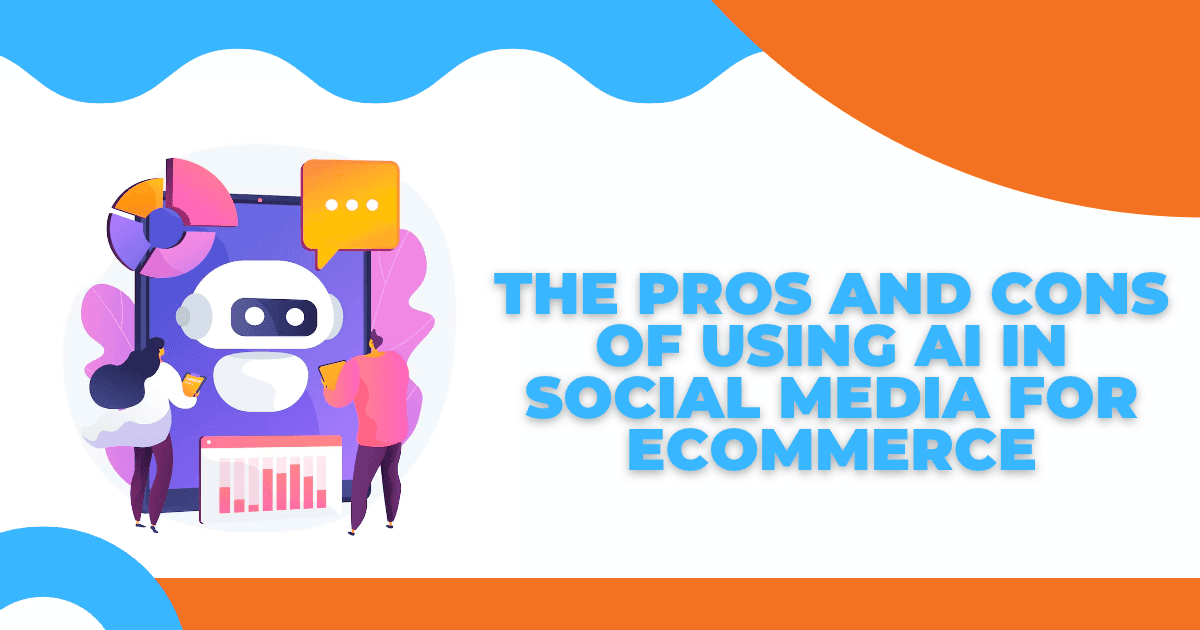
Artificial intelligence (AI), an incredible innovation that’s changing the world can’t possibly have any downsides, right? Well, as much as we’d love to believe that, there’s always another side to the story. So, let’s dive into the pros and cons of using AI in social media for ecommerce.
Pros
- Personalized user experience
AI can analyze customer behavior, preferences, and purchase history like a nosy neighbor. But instead of gossiping, it uses that information to create a tailored shopping experience for each user. This means your customers will see products they’re more likely to buy, making the whole online shopping thing more efficient and enjoyable.
By harnessing the power of AI development, ecommerce businesses can stay ahead in an ever-competitive market, enhance their operations, and create unforgettable experiences for their customers. As this technology continues to advance, the potential for AI to reshape the ecommerce industry will only expand.
- Improved customer support
Remember the days when you had to wait for ages for a human customer support rep to help you out? Well, those days are almost gone, thanks to AI-powered chatbots. These virtual assistants can handle a myriad of customer inquiries and complaints, providing instant responses and saving precious time for both customers and businesses.
- Enhanced content creation and curation
AI doesn’t just improve customer support; it’s also making your social media content better. With natural language processing and image recognition capabilities, AI can generate engaging posts and suggest relevant content, including AI blog posts, that appeals to your target audience.
Learn more: How Can AI Improve The Process of Creating Content?
- Precise targeting and retargeting
If you’ve ever felt like social media ads are stalking you, you’re not alone. AI-powered algorithms are responsible for that creepy feeling. They analyze user data to target and retarget ads more accurately, increasing the chances of conversion. So, while it might feel like Big Brother is watching, at least he’s helping businesses make more money.
Cons
- Privacy concerns
Using AI in social media for ecommerce raises some serious privacy concerns. The data collection and analysis necessary for AI to work effectively can lead to the invasion of users’ personal space. And we all know how much people love having their private lives dissected by machines.
- Loss of human touch
AI can mimic human interaction, but can it ever truly replace the genuine connection between people? As businesses rely more on AI-driven customer support and content creation, there’s a risk of losing the human touch that makes the shopping experience special. It’s like receiving a heartfelt letter written by a robot – it just doesn’t have the same impact.
- Potential for job displacement
The rise of AI might be good news for ecommerce businesses, but it could spell trouble for some workers. As AI takes over roles in customer support, content creation, and marketing, people in those jobs might face unemployment. The machines are taking over, and they’re coming for your job next.
- Ethical dilemmas
Integrating AI in social media for ecommerce opens up a Pandora’s box of ethical questions. How do we ensure that AI-driven algorithms don’t discriminate against certain users? How do we balance the benefits of data collection with the potential risks to privacy? These are just a few of the issues that keep philosophers, lawmakers, and insomniacs up at night.
Boosting Your Brand with Automation: Should You Jump on the Bandwagon?
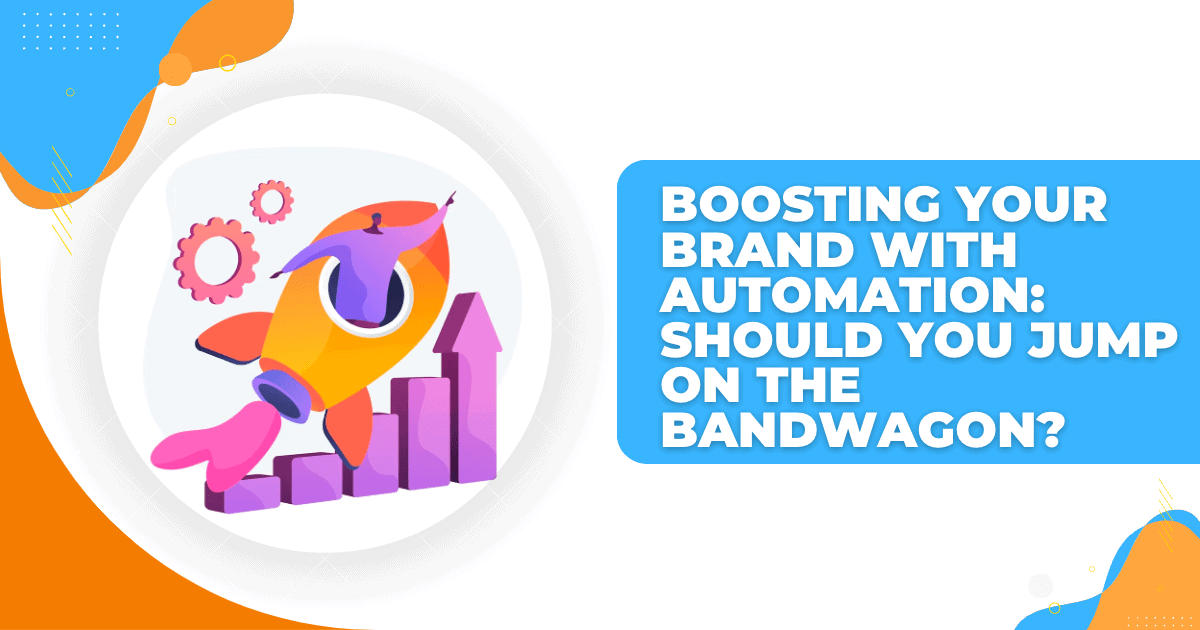
In the bustling world of ecommerce, automation has been making waves, turning heads, and raising eyebrows. It’s like the cool kid at school that everyone wants to be friends with. But before you run off to join the automation fan club, let’s take a moment to evaluate whether this latest trend is truly worth the hype.
The Glitz and Glam of Automation
No doubt, automation can work wonders for your business. It’s like having a personal assistant that streamlines operations, saves you precious time, and may even cut down costs. For example, Hootsuite offers social media automation to free up your time on manual work.
Automating mundane tasks such as inventory management, order processing, and social media scheduling can make your brand run as smoothly. However, there’s a catch — striking the right balance between efficiency and coming across as an emotionless cyborg.
The Dark Side of Automation
Customers are drawn to brands that offer genuine connections. They want to feel like they’re interacting with real human beings, not cold, automated systems that spew out lifeless, cookie-cutter responses. If you wholeheartedly embrace automation without thinking it through, you risk alienating the very customers you’re trying to impress.
Finding the Sweet Spot
Fear not, for automation isn’t the villain in our story. When executed thoughtfully, it can actually elevate your brand’s image and create delightful experiences for your customers. The secret lies in finding that perfect equilibrium between automation and good old-fashioned human touch.
Social Media: Be Present, Be Human
Automate your social media posts, but remember to engage with your audience in real-time. Respond to comments, answer questions, and participate in conversations in a way that feels genuine and human.
Customer Support: The Best of Both Worlds
In the realm of customer support, a combination of AI-powered chatbots and empathetic human agents can guarantee that your customers receive the assistance they need without feeling like they’re talking to an unfeeling automaton.
So, Should You Hop on the Automation Train?
Deciding whether to embrace automation depends on your ability to maintain a delicate balance between efficiency and authenticity. If you can master the art of automation while preserving your brand’s human essence, you’ve got yourself a first-class ticket to success. But, if you can’t commit to nurturing genuine connections with your customers, it’s best to think twice before jumping on the automation bandwagon.
Strategies to Implement AI Technology into Your Ecommerce Business Plan
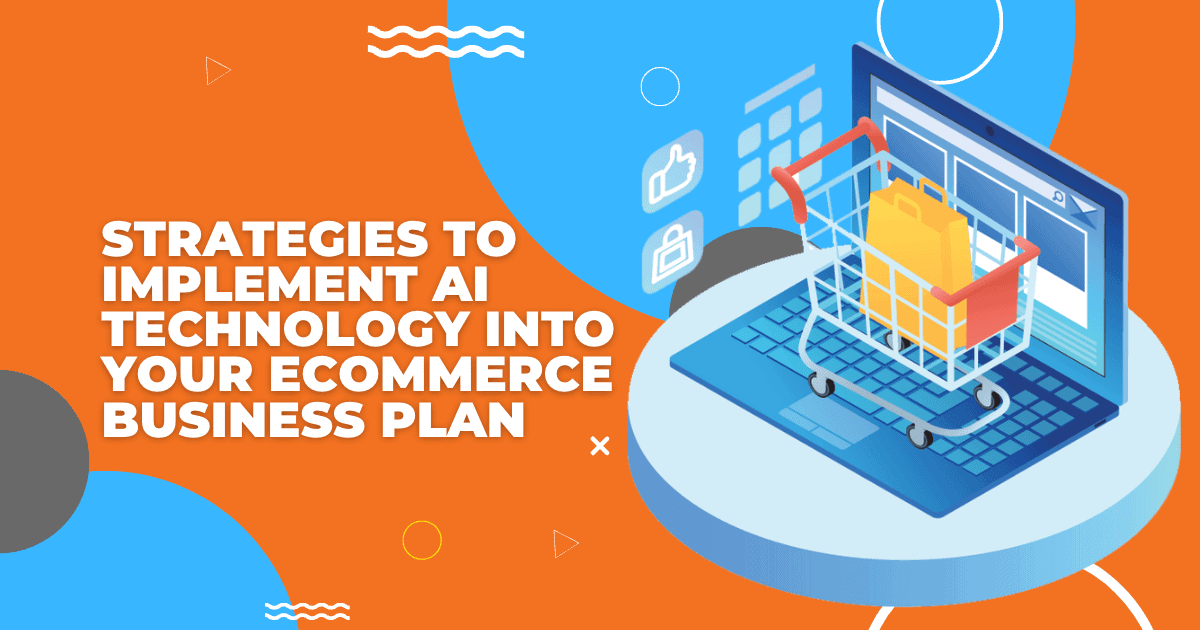
So, you’re considering joining the club and implementing AI technology into your ecommerce business plan. Well, buckle up because we’re about to dive into some strategies that’ll help you make the most of this futuristic tech without turning your business into a robotic mess. You can use an AI business plan generator to quickly structure your strategy, forecast future trends, and gain data-driven insights that guide smarter decisions.
1. Personalization: Get Up Close and Personal
- Collect customer data (purchase history, browsing behavior, demographics, etc.).
- Utilize AI algorithms to analyze this data and create customer segments based on shared characteristics.
- Develop personalized marketing campaigns targeting each customer segment, including customized product recommendations, promotions, and email content.
- Continuously monitor campaign performance and refine your website personalization efforts based on customer feedback and engagement.
2. Chatbots: Your Friendly Neighborhood Helpers
- Choose a chatbot builder platform compatible with your ecommerce platform and customer support channels (website, social media, etc.) or create a custom AI development solution.
- Train your chatbot to handle common customer queries using natural language processing (NLP) and machine learning algorithms.
- Integrate a human takeover option in the chatbot, allowing customers to request assistance from a human support agent when needed.
- Monitor chatbot performance and customer interactions to identify areas for improvement and ensure a seamless support experience.
3. Sentiment Analysis: Decoding the Emoji Mystery
- Gather customer feedback from social media, reviews, and other channels.
- Employ AI-powered sentiment analysis tools to process this feedback, identifying the prevailing emotions and sentiments.
- Analyze the results to uncover trends and areas of concern, and use these insights to adjust your marketing, product offerings, and customer support strategies.
- Regularly conduct sentiment analysis to track changes in customer sentiment and stay responsive to their needs.
4. Inventory Management: A Stockroom Savior
- Integrate AI-powered demand forecasting tools with your inventory management system.
- Train the AI model using historical sales data and relevant external factors (seasonality, promotions, market trends, etc.).
- Use the AI-generated demand forecasts to adjust your inventory levels and avoid overstocking or understocking situations.
- Continuously update and refine the AI model as new data becomes available to maintain accurate demand predictions.
5. Pricing Optimization: The Goldilocks Principle
- Choose an AI-based pricing optimization tool that suits your business needs and integrates with your ecommerce platform.
- Feed the tool with relevant data, including competitor pricing, customer demand, inventory levels, and market trends.
- Let the AI algorithm determine the optimal pricing strategy for each product, balancing profit margins with customer willingness to pay.
- Monitor pricing performance and adjust the AI model parameters as needed to maintain an effective pricing strategy.
6. Customer Service: Automate Your eCommerce Customer Support
- Save time and money by automating your customer support.
- Reduce manual effort spent on performing repetitive tasks (such as answering FAQs).
- Respond faster to customer inquiries and smash marketplace SLAs.
- Use auto-responders to ensure customers receive an immediate, relevant reply even when your customer service team is unavailable (such as after hours or during holidays).
- Automatically apply personalization to messaging to provide better, more customized customer support.
- Improve the scalability of your eCommerce business by boosting profits, increasing ROI, and freeing up your staff’s time to focus on growth.
Free Tools to Help Get You Started

If you’re a budget-conscious entrepreneur looking to dip your toes into digital marketing, here’s a list of free tools that’ll help you kickstart your online presence without burning a hole in your pocket.
Lumen5
Lumen5 is a cutting-edge AI-driven video creation platform perfect for marketers and content creators alike. Its intuitive interface and powerful AI allow users to transform articles, blog posts, and scripts into engaging and professional-looking videos with minimal effort. No more wrestling with complex software or explaining your vision to others — Lumen5 puts the power in your hands.
MobileMonkey
MobileMonkey is an AI-driven chatbot platform designed to help businesses streamline their customer service and lead generation efforts. With MobileMonkey, you can create conversational bots that handle inquiries, answer FAQs, and capture leads while providing a seamless and engaging user experience. It’s like having a team of virtual customer service agents without the need for constant supervision or team-building exercises.
Copysmith
Copysmith is an AI-powered copywriting tool that creates high-quality, compelling, and SEO-optimized content for your marketing campaigns, blogs, and product descriptions. With its natural language generation capabilities, Copysmith can draft everything from ad copy to blog posts, all while maintaining a human-like tone that keeps readers engaged. It’s like having a team of talented writers at your disposal without the drama of missed deadlines or creative disagreements.
CopyMonkey
CopyMonkey is a revolutionary AI-powered Amazon Listing Optimization tool that streamlines the process of creating and enhancing your Amazon listings. By harnessing the power of artificial intelligence, CopyMonkey expertly weaves crucial keywords into your listings, ensuring that you secure a prime spot on the first page of organic search results.
With its user-friendly interface and lightning-fast performance, CopyMonkey takes the guesswork out of optimizing your Amazon listings, leaving you free to focus on growing your e-commerce empire.
Exod.ai
Exod.ai is a groundbreaking AI-driven marketing automation platform that enables marketers to effortlessly design, optimize, and manage their campaigns across a range of channels. Its advanced algorithms analyze performance data, identify patterns, and make real-time adjustments to ensure maximum ROI. With Exod.ai, you can leave the heavy lifting to the AI while you bask in the glory of your marketing successes.
Design.ai
Design.ai is an innovative AI-driven graphic design platform that simplifies the process of creating professional-quality visuals. By harnessing advanced machine learning algorithms, it enables users to produce eye-catching content for marketing campaigns, social media, and more with ease. With Design.ai, you can unleash your inner designer without the steep learning curve or reliance on expensive design software.
Synthesia.io
Synthesia.io is a pioneering AI-powered video creation platform that allows users to generate personalized and engaging videos with ease. Its cutting-edge technology enables you to create professional-looking videos for marketing campaigns, training materials, or product demonstrations without the need for complex software or costly equipment. Step into the world of Synthesia.io and watch your creative vision come to life through video editing.
Omnisend
Omnisend is an AI-powered marketing automation platform that assists businesses in streamlining and optimizing their marketing efforts across multiple channels. With its sophisticated segmentation and personalization features, Omnisend enables you to create targeted and engaging campaigns that drive conversions and foster customer loyalty.
Unlock the full potential of your marketing endeavors with the intelligent insights and automation provided by Omnisend.
Namogoo
Namogoo is an AI-driven platform that secures your online customer journey by identifying and preventing unauthorized ad injections, malware, and data theft. Its advanced machine-learning capabilities ensure a seamless, secure, and enjoyable browsing experience for your customers.
With Namogoo, you can trust that your online business is protected from malicious threats, giving you the peace of mind to focus on growing your digital empire.
Syte.ai
Syte.ai is a trailblazing AI-driven visual search platform that revolutionizes the way consumers discover and interact with products online. Syte.ai enables users to find products based on visual cues by leveraging sophisticated image recognition technology, enhancing the shopping experience and boosting conversion rates.
With Syte.ai, your customers can effortlessly discover their desired products, making shopping online a breeze and driving unparalleled engagement.
Attention Insight
Attention Insight is a SAAS platform that predicts where users will look while engaging with content. It helps to identify design problems and provides insights into user attention without collecting fresh data from participants.
Related Questions

- What key factors should I consider when selecting AI tools for my ecommerce business’s social media strategy?
When choosing AI tools, consider their features, ease of use, scalability, integration capabilities, and cost. It’s essential to select tools that align with your business goals, target audience, and available resources.
- How do AI tools help small businesses compete with larger, more established ecommerce companies on social media?
AI tools can level the playing field for small businesses by providing cost-effective solutions for targeting customers, automating processes, and analyzing data. This allows small businesses to make data-driven decisions and improve their social media strategies without investing in large marketing teams or expensive tools.
- Can AI tools help with content creation and curation for my ecommerce business’s social media platforms?
Yes, many AI tools are designed to assist with content creation and curation. They can help generate ideas, create engaging visuals, and even write copy for your social media posts with tools like an AI design assistant transforming how efficiently these tasks are handled. These AI content writers can save time and ensure that your content is consistently high-quality and engaging for your audience.
- What are the potential ethical concerns of using AI tools for my ecommerce business’s social media strategy?
Ethical concerns may include data privacy, bias in AI algorithms, and the potential for AI-generated content to be less authentic or genuine. To address these concerns, it’s important to choose reputable tools that prioritize data security and privacy and to strike a balance between automation and human touch in your social media strategy.
- How can I measure the success of using AI tools for my ecommerce business’s social media strategy?
To measure success, establish clear goals and key performance indicators (KPIs) before implementing AI tools. Monitor changes in engagement, reach, conversions, and other relevant metrics after introducing AI tools to your strategy. Regularly analyze the results and adjust your approach as needed to optimize your social media strategy’s effectiveness.
Final Thoughts on How AI is Changing Social Media
The potential of AI tools in revolutionizing social media for ecommerce businesses is undeniable. As the landscape continues to evolve, staying ahead of the curve means embracing innovation and leveraging the power of AI. By harnessing these cutting-edge tools, you’ll be able to streamline your processes, engage your audience more effectively, and ultimately boost your bottom line.

